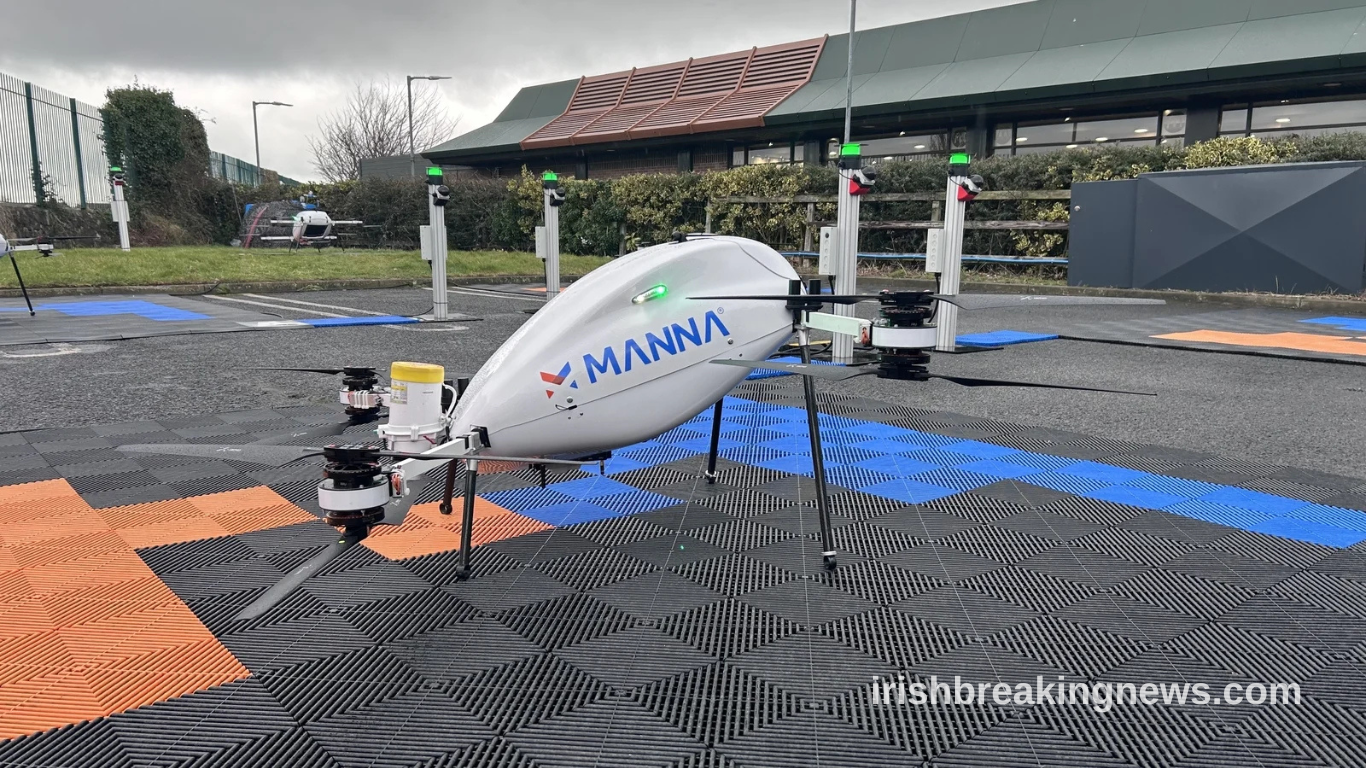Manna, an innovative Irish drone delivery startup, is redefining how we think about fast and efficient deliveries. With a focus on residential areas in Dublin and other European regions, Manna aims to provide rapid drone services for everyday needs — from hot coffee to everyday essentials. What sets Manna apart from bigger competitors like Amazon and Wing is its lean operational model.
Despite having raised only $60 million, Manna’s founder Bobby Healy is confident that the company’s approach of cost-effective, reliable drones will enable them to achieve an ambitious target: one million deliveries annually. As Manna continues expanding its reach, the startup is poised to revolutionize delivery services, offering fast, sustainable solutions to consumers and setting a new benchmark in the drone delivery industry.
A Coffee in the Sky — In Under Three Minutes
In select Dublin suburbs, if you crave a fresh cup of coffee, you no longer need to leave your home — just order it, and a drone from Irish startup Manna will fly it right to your doorstep. Within minutes, your piping-hot beverage is lowered into your yard by a tether, launched from a nearby strip mall.
Coffee has become the top item delivered by Manna’s autonomous drones. According to the company, the high demand for caffeine in the mornings and afternoons aligns perfectly with its efficient drone design. Unlike larger players such as Amazon, Alphabet’s Wing, or unicorn startup Zipline, Manna claims it can deliver faster, using fewer drones and staff — and more importantly, turning a profit on each delivery.
The Founder’s Bold Claim: Profitable, Scalable, and Ready
Founder Bobby Healy, previously of car rental tech firm CarTrawler, insists that Manna’s lean operations are the key to its success. “It’s not about massive investments,” he told Forbes. “It’s about time, trust, and thousands of flight hours.” While major competitors have poured hundreds of millions into drone delivery infrastructure, Manna has raised only $60 million, including a new $30 million round led by Molten Ventures and Tapestry VC, bringing its valuation to over $150 million.
With 200,000 successful deliveries since 2020 and $6 million in annual revenue, Manna is still a small player by volume. Yet, Healy sees massive growth ahead. Plans are in motion to expand service to cover 1.1 million people in Dublin, up from three to 11 drone bases. By year-end, Healy says Manna will achieve an annualized rate of 1.5 million deliveries — an industry-leading figure.
Expansion Across Europe — But Not the U.S.
Manna is also scaling up its operations in Espoo, Finland, with 100 deliveries per day, and has its sights set on other parts of Europe, thanks to a favorable EU-wide regulatory framework introduced in 2023. The U.S. market, despite its size and potential, remains elusive. The Federal Aviation Administration (FAA) has yet to implement scalable drone delivery regulations, limiting U.S. operations to small-scale trials.
“Irony of all ironies,” said Healy, “Europe is the only place where drone delivery can truly scale today.” According to him, American drone operators face a three-year disadvantage compared to their European counterparts.
Inside Manna’s Operations: Low Cost, High Efficiency
Manna’s drones operate from strip malls, using removable cargo bays with integrated batteries — a system that allows for quick “hot-swapping” between flights. Each drone can make up to eight deliveries per hour within a three-mile radius. In comparison, Healy claims competitors like Zipline and Wing, which use built-in battery systems, only manage 1.4 deliveries per hour.
One Manna staffer can manage 25 to 30 deliveries per hour from a base with eight drones. With autonomous flight capabilities, a single remote operator at Manna’s HQ can monitor up to 20 drones simultaneously. This efficiency translates into a $4 cost per delivery, which Healy believes will drop to $1 with volume increases — significantly lower than McKinsey’s estimated $9–$11 per delivery by traditional road vehicles over five miles.
Delivery Partnerships Are Key to Scaling
While some U.S. analysts believe regulatory delays are overstated, most agree that scalable operating models and commercial partnerships are essential for drone delivery to flourish. Manna has struck deals with Wolt (DoorDash’s international wing) and Just Eat, with a third major app partnership nearly finalized.
Rather than approaching retailers one by one, Manna is embedding itself directly into the largest delivery platforms, helping them offer drone delivery at the same cost as road delivery. This strategy, Healy says, opens the floodgates for mass adoption. “It’s an open goal now for us.”
Frequently Asked Questions
What is Manna, and what does it deliver?
Manna is an Irish drone delivery startup primarily delivering food and beverages — with coffee being the most popular item.
How fast are Manna’s drone deliveries?
Deliveries are typically completed in under three minutes from launch to drop-off.
Is Manna profitable?
According to founder Bobby Healy, yes — each delivery is currently profitable, unlike many competitors.
Where does Manna currently operate?
Manna is active in Dublin suburbs and Espoo, Finland, with plans to expand throughout Europe.
Why isn’t Manna operating in the U.S.?
Due to the lack of scalable FAA regulations, Manna has paused U.S. expansion and is focusing on EU markets for now.
Conclusion
Manna may not have the funding war chest of its global rivals, but it’s proving that smart design, lean operations, and a clear regulatory path can outperform sheer capital. With bold plans to scale to over 1.5 million deliveries a year and growing partnerships with top delivery apps, this Irish startup is not just flying high — it’s changing the course of drone delivery altogether.

